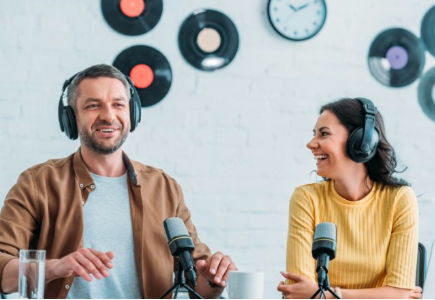In today’s fast-paced world, learning doesn’t have to be limited to traditional classrooms or lengthy textbooks. Podcasts have emerged as a popular and effective way to access knowledge on the go. Whether you’re commuting, exercising, or relaxing at home, podcasts provide a flexible and engaging learning experience. Let’s explore the key benefits of learning through podcasts and how they support lifelong education.
1. Learning Anytime, Anywhere
One of the biggest advantages of podcasts is their portability. You can listen while jogging, cooking, or commuting, turning otherwise passive time into an opportunity to learn. This flexibility makes it easier for students, professionals, and curious minds to keep learning despite busy schedules.
2. Boosting Comprehension and Retention
Podcasts often use storytelling, interviews, and real-life examples, which help listeners understand complex topics more easily. The conversational tone used in many educational podcasts makes the material more relatable and memorable compared to reading dense texts.
3. Supporting Diverse Learning Styles
Not everyone learns the same way. Some people retain information better when they hear it rather than read it. Podcasts cater to auditory learners and can complement other methods like reading and visual learning, offering a more inclusive educational experience.
4. Encouraging Consistent Learning Habits
Subscribing to a weekly or daily educational podcast can encourage regular learning. Just like following a favorite TV show, learners may look forward to each new episode, which fosters consistency—a key factor in long-term knowledge retention.
5. Access to Experts and Global Perspectives
Many podcasts feature interviews with subject-matter experts, authors, educators, and professionals from around the world. This gives listeners exposure to a wide range of insights, often presented in a conversational and accessible format.
6. Free and Easy to Access
Most educational podcasts are free and can be streamed or downloaded from various platforms like Spotify, Apple Podcasts, or Google Podcasts. This open accessibility breaks down barriers to quality learning and promotes educational equity.
7. Improving Listening and Language Skills
Listening to well-produced podcasts can enhance listening comprehension, vocabulary, and pronunciation—especially for those learning a new language or looking to refine their communication skills.
8. Encouraging Independent Learning
Podcasts empower learners to take charge of their education. From science and history to self-improvement and digital skills, there’s a podcast for nearly every interest. This autonomy helps develop critical thinking and self-motivation.
Conclusion
Podcasts have transformed the way people learn by offering flexible, accessible, and engaging content. They support continuous learning, suit various learning preferences, and provide a window into expert knowledge—all without the need for expensive materials or formal settings. Whether you’re a student, educator, or lifelong learner, integrating podcasts into your routine can open up a world of educational possibilities—one episode at a time.














